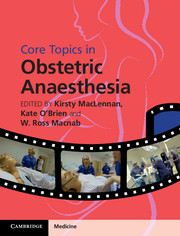Book contents
- Frontmatter
- Contents
- List of contributors
- Preface
- Section 1 Basic science, epidemiology and service organization
- Section 2 Obstetric aspects
- Section 3 Provision of anaesthesia
- Section 4 Medical conditions in pregnancy
- Section 5 Postpartum complications and obstetric emergencies
- Section 6 Service organization
- 27 Multidisciplinary teaching and training on the delivery unit
- 28 Clinical governance and patient safety
- 29 Ethics, consent and the law
- Index
- Plate section
- References
28 - Clinical governance and patient safety
from Section 6 - Service organization
Published online by Cambridge University Press: 05 December 2015
- Frontmatter
- Contents
- List of contributors
- Preface
- Section 1 Basic science, epidemiology and service organization
- Section 2 Obstetric aspects
- Section 3 Provision of anaesthesia
- Section 4 Medical conditions in pregnancy
- Section 5 Postpartum complications and obstetric emergencies
- Section 6 Service organization
- 27 Multidisciplinary teaching and training on the delivery unit
- 28 Clinical governance and patient safety
- 29 Ethics, consent and the law
- Index
- Plate section
- References
Summary
Introduction: how clinical governance originated
The NHS was established in 1948 and there was no agenda for quality of care. In the early years of the NHS most doctors rarely looked at their clinical practice or results. In the late 1960s hospital activity analysis was introduced to provide better patient-based information.
In 1969 the Ely Hospital report was published; this was the first of the modern inquiries into failure of care: this included cruelty to patients, threatening behaviour, indifference to complaints and lack of care by the physician superintendent. Subsequently there have been more than 30 reports highlighting the exact same failings.
The NHS had become a victim of its own success and it had to acknowledge that there had to be clear financial bounds. The Griffiths report (1983), commissioned by the government, described a lack of accountability for quality of care at the local level. This led to:
• Appointment of managers to lead healthcare units
• Medical staff involvement in the management teams
• More flexibility in team structures
• Introduction of clinical responsibility for quality of the service.
The first government white paper was published in 1997. ‘The New NHS, Modern, Dependable’ was the first document to directly address the issues of quality and effectiveness of clinical care and the introduction of a national framework to drive improvements in NHS performance.
On the back of this paper two new organizations were commissioned:
• National Institute for Clinical Excellence (NICE)
• To assess treatments using up to date evidence
• To provide high-quality national guidelines
• The Commission for Health Improvement (CHI)
• This body was set up to ensure that high standards of quality and safety for patients and staff were established and maintained.
In 1998 a white paper was published ‘A First Class Service: Quality in the New NHS’. This was the first paper to mention the concept of clinical governance. The rationale was to have a framework, which would ensure that high standards of care are achieved. The paper also stated that:
• Staff must undertake lifelong learning
• Staff must maintain professional standards
• The NHS needs to be more open and accountable to the public.
Scally and Donaldson (1998) commented on the fact that quality of care issues had become secondary to fiscal and activity targets, subsequent to the Griffiths report.
- Type
- Chapter
- Information
- Core Topics in Obstetric Anaesthesia , pp. 219 - 224Publisher: Cambridge University PressPrint publication year: 2015



